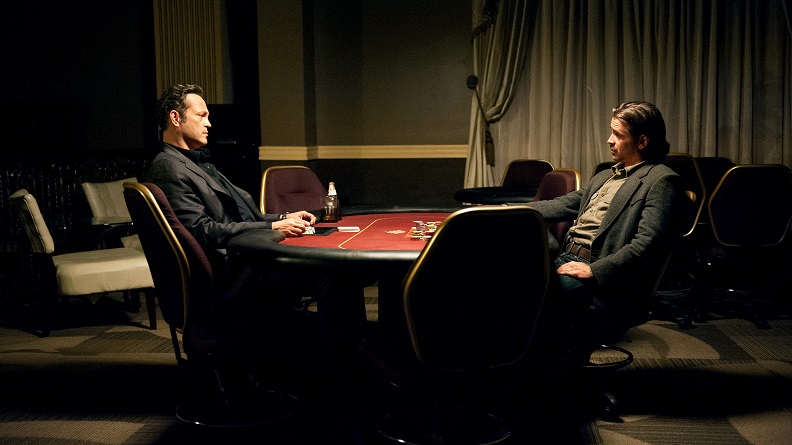True Detective
“Black Maps and Motel Rooms”
(HBO)
B+
As last week’s episode made evident, the long and steady climb of True Detective’s second season may finally be gearing up for a satisfying payoff. “Black Maps and Motel Rooms” continues this shift by exploring the repercussions of last Sunday’s undercover infiltration and establishing strong directions for its leads with convincing and gripping execution. Getting such quality so late in the game is a breath of fresh air; maybe, just maybe, we undeservedly doubted showrunner Nic Pizzolatto, who may have actually had it in the bag the whole time.
The choice to include “motel” in the title is fitting, as much of the drama is contained within those walls. As the three detectives recoup, Bezzerides, coming down from molly, has a Freudian slip as she recalls her visions at the preceding episode’s sexcapades. She then attempts to repress this memory with a shot-down sexual advance on Velcoro. Later, when talking with the found missing girl, Bezzerides learns that what she saw as a rescue from a sexually toxic life was, in fact, unwanted by the woman. Bezzerides’ conflicted relationship with sex has clouded many of her decisions thus far.
Worried that the preceding outing’s exploits have put their families in danger, Bezzerides and Woodrugh spend time gathering their loved ones and sending them to safety. While talking to her father, Bezzerides admits her once-forgotten memories of being kidnapped for four days, subsequently learning that her father has always been concerned with the event and how it shaped her. Similarly, Woodrugh struggles for intimacy with his wife, but she shoots this moment down, suggesting, “You don’t try right” in regard to his pursuits of being a “good man.” At this point, the Caspere case is less of an investigation and more of a sequence of events that help these characters reconcile demons. Considering they’ve been deprived of any peace of mind thus far, these characters deserve to do so.
Eventually and thankfully, Semyon gets his hands real dirty. For six episodes, his story has layered on a stagnating amount of development with only a few rewards. Here, however, he realizes the fruitless nature of his endeavors and posits a big middle finger by first killing his double-crossing employee, then burning down his recently-taken-over casino and club, and finally coordinating a sting that will claim enough diamonds — from the people who betrayed him — to restore his liquid assets. His attitude is exciting, and the prospect of his swindle bringing all our protagonists together to pull off a collectively beneficial stunt further invigorates anticipation for the season finale.
The possession of last week’s stolen documents provides the characters with more clues to piece together the core conspiracy, like a so-called “black map.” These are the worst bits of the episode, presenting anti-climactic reveals of the corruption’s key players, whom we already heavily suspected, and left-field connections (Caspere’s secretary?). However, after the death of Detective Davis, the head of the operation, the stakes are raised. Bezzerides and Velcoro find themselves on the wrong side of the law, and Woodrugh’s investigating yields more red flags, inciting blackmail by use of photographs from his blackout sexual exploits. This leads the latter into the confines of the Black Mountain of his past, where the situation goes awry and forces him to fight his way out. In the end, Woodrugh succeeds only to suffer a shocking turn of events. Poor Woodrugh, in all his closeted homosexuality, was destined to be the most tragic character of this season.
Back in the motel room, Bezzerides and Velcoro bond over the bad. Bezzerides remarks, “You’re not a bad man.” Too twisted to heed these words, he grieves, “Do you miss anything?” We know they all do; this is a story about people who reside in a depressing aftermath of a life-defining incident, where no amount of words — but maybe sex — can suppress the foreboding sense they feel they’ve incited. (Channeling an idea from the first season: “The world needs bad men; we keep the other bad men from the door.) Hopefully, the 90-minute season finale makes them feel needed, because they’ve certainly inspired the empathy to warrant justice for their deeply troubled souls.





